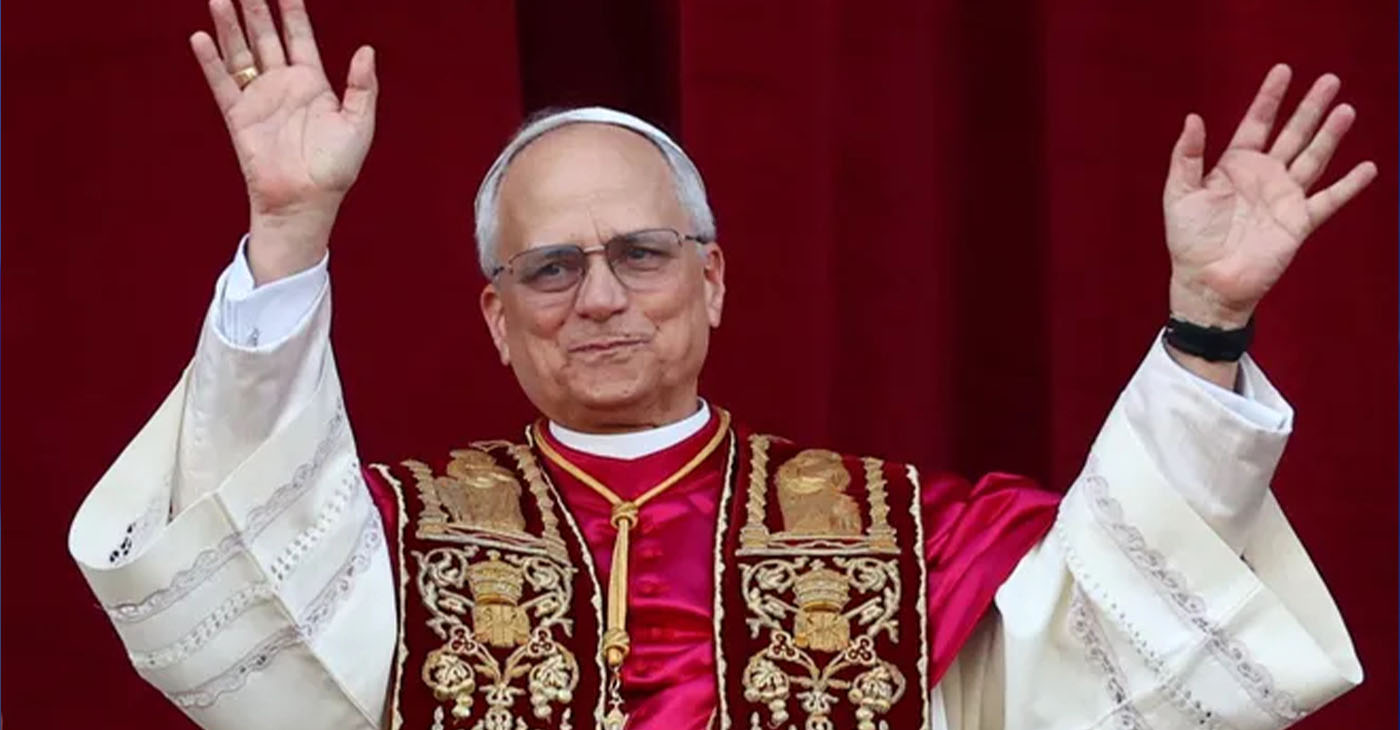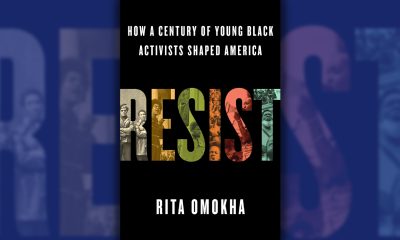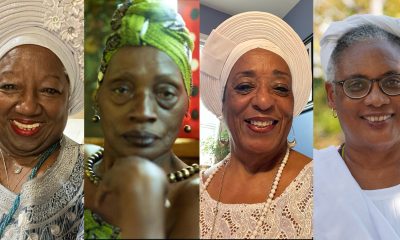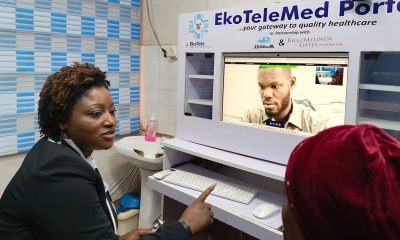World
Boko Haram Kidnaps Hundreds, Tells Stories of Chibok Girls

In this photo taken Saturday, Jan. 31, 2015. Dorcas Aiden, 20 years old, speaks to a journalist in Yola, Nigeria. Dorcas Aiden was another of the girls caught in Boko Haram’s siege. She had finished high school and was living at home when the war came to her village. Fighters took her to a house in the town of Gulak and held her captive for two weeks last September. The more than 50 teenage girls crammed into the house were beaten if they refused to study Quranic verses or conduct daily Muslim prayers, she says. When the fighters got angry, they shot their guns in the air. Aiden finally gave in and denied her Christian faith to become Muslim, at least in name, she says. (AP Photo/Lekan Oyekanmi)
CHIKA ODUAH, Associated Press
YOLA, Nigeria (AP) — When Islamic extremists snatched more than 270 girls from the Chibok boarding school in Nigeria in the dead of night, protests broke out worldwide. The U.S. pledged to help find them, and the #BringBackOurGirls hashtag was born.
Some 10 months later, most are still missing. The Boko Haram extremist group sees the mass kidnapping as a shining symbol of success, and has abducted hundreds of other girls, boys and women. The militants brag to their new captives about the surrender of the Chibok girls, their conversion to Islam and their marriage to fighters.
“They told me the Chibok girls have a new life where they learn to fight,” says Abigail John, 15, who was held by Boko Haram for more than four weeks before escaping. “They said we should be like them and accept Islam.”
The kidnappings reflect the growing ambition and brazenness of Boko Haram, which seeks to impose an Islamic state across Nigeria, Africa’s most populous country. Some 10,000 people have died in the Islamic uprising over the past year, compared to 2,000 in the previous four years, according to the U.S. Council on Foreign Relations.
“It’s devastating,” said Bukky Shonibare, an activist in Abuja, of the kidnappings. “It makes you wonder, what is being done?”
John was among three girls interviewed by The Associated Press who recently escaped from Boko Haram. While their stories could not be independently verified, they were strikingly similar, and all spoke of their captors’ obsession with the Chibok girls.
The girls had no idea whether the militants were telling the truth or making up stories to taunt their victims. John says the fighters enjoyed relating how they had whipped and slapped the Chibok girls until they submitted.
When the Nigerian air force dropped a bomb on the house where John was confined, she tried to escape, she says. She wrestled with the fighters, but they broke her am and hauled her off to another house.
At the end of last year, the Nigerian army liberated the town where she was held. She is now in Yola with her father, sister and six brothers, in a house overcrowded with refugees. She finally was able to get medical attention for her fractured right arm, which remains in a cast.
The kidnappings of the Chibok girls in April brought Boko Haram to the world’s attention in a way the group could not have imagined. The hashtag #BringBackOurGirls was tweeted more than 480,000 times globally in early May, and U.S. first lady Michelle Obama held it up in a sign to television cameras. She said at the time, “In these girls, Barack and I see our own daughters …we can only imagine the anguish their parents are feeling right now.”
Yet in the 10 months since, Boko Haram has increased the tempo and ferocity of its insurgency. In August, it began seizing and holding towns, and — copying the Islamic State group — declared it would recreate an ancient Islamic caliphate in the region. The fighting has since spilled across Nigeria’s borders, and the African Union this month authorized a multinational force of 8,750 troops to try to stamp it out.
Dorcas Aiden, 20, was another of those caught in Boko Haram’s siege. She had finished high school and was living at home when the war came to her village. Fighters took her to a house in the town of Gulak and held her captive for two weeks last September.
The more than 50 teenage girls crammed into the house were beaten if they refused to study Quranic verses or conduct daily Muslim prayers, she says. When the fighters got angry, they shot their guns in the air. Aiden finally gave in and denied her Christian faith to become Muslim, at least in name, she says.
One day, the fighters stormed into the room where she was kept locked up with a dozen other girls. They showed a video of the Chibok girls, dressed in hijabs, with only their faces visible through their veils. Aiden says she was so overwhelmed that she cried.
The fighters said the Chibok girls were all Muslims now, and some were training as fighters to fight women, which Boko Haram men are not supposed to do.
Aiden’s captors boasted about how they had married off the Chibok girls, she says. One fighter said he would marry her. She balked.
“I said, ‘No, I will not marry you,'” Aiden recounts. “So he pulled out a gun and beat my hand.”
Aiden says the insurgents threatened to break the legs of any girl who tried to escape, but she and six others ran anyway. As she made her way through abandoned farm fields, she noticed that Boko Haram had filled about 10 other houses with kidnapped girls and women.
Aiden, who is now in Yola with tens of thousands of other refugees, dreams of going to university, in defiance of the extremists’ insistence that girls should be married, not educated. The nickname Boko Haram means “Western education is forbidden or sinful.”
Another escapee, a shy 16-year-old captured in September, begs that her name not be published because she escaped only a few weeks ago and believes the fighters are actively searching for her. After the girl’s village was attacked four times, she fled to a great-aunt. Then that village also was targeted, she says.
The fighters held her for four months. When she escaped, she walked through the bush and across the border into Cameroon to avoid areas under Boko Haram’s control. She is now taking refuge in a Catholic church in Yola.
All the girls say they were not raped, despite the fears of some villagers. Instead, the fighters said they wanted the girls to remain virgins until they were married off.
“They said they are doing the work of God, so they will not touch us,” the 16-year-old recounts.
As she tells her story, she fidgets and looks down at her hands, clasped in her lap. She recounts how one fighter, nicknamed “Tall Arab,” was set on marrying her. She pleaded that she was too young, but was told, “Do you think you are better than those Chibok girls that we kidnapped?”
The man told her the Chibok girls were “enjoying their matrimonial homes,” she remembers. He also said the Chibok girls had turned against their parents, and were “ready to slit their parents’ throats” if they ever saw them again.
Some never will. Even if the girls are released, people in Chibok say at least 13 of their parents have died since they were seized, in Boko Haram violence or possibly stress-related illness.
While dozens of Chibok girls escaped on their own after their kidnapping, 219 are still missing. Nigeria’s military initially feared any action could lead to the girls being killed. But villagers reported last week that air force jets have begun bombing the Sambisa Forest — the area where fighters told Aiden some girls still are held captive.
__
AP writer Michelle Faul contributed to this story from Dakar, Senegal.
Copyright 2015 The Associated Press. All rights reserved. This material may not be published, broadcast, rewritten or redistributed.
Activism
African Union Group to Award Rev. Dr. Amos Brown for Bringing Civil Rights Movement to Global Stage
Dr. Macaulay Kalu, secretary general of AU6RG, will present Dr. Brown with the Global Peace Builder Award. Other presenters include Rev. Dr. Freddie Haynes, senior pastor of Friendship West Baptist Church in Dallas; Oakland Mayor Barbara Lee, long-time advocate for appropriations to Africa as a congressmember; Rick Callendar, California-Hawaii president of the NAACP; Dr. Ike Neliaku, president and chairman of the Nigerian Institute of Public Relations; Pastor Ituah Ighodalo, head of the African Leadership Group and Ambassador Thompson and John William Templeton, founder of the Journal of Black Innovation National Black Business Month®.

By Carla Thomas and John William Templeton
On Aug. 31, the Third Baptist Church of San Francisco will mark its 173rd anniversary with an event steeped in history and global significance. This year’s commemoration, themed “Achieving Dr. King’s Promised Land Together,” will honor the lifelong achievements of Dr. Amos C. Brown, Sr.— a towering figure in the Civil Rights Movement — on a day that also observes the International Day for People of African Descent.
Brown will be recognized by the African Union’s organ for Africans abroad for ‘planetizing’ the civil rights movement gains at San Francisco’s Third Baptist Church, 1399 McAllister St., at 3 p.m.
The African Union, made up of 54 countries on the African continent, consists of five regions. It created a sixth region, the African Union Sixth Region Global (AU6RG), for the 400 million Africans living abroad. On Sept. 7, the second AU-Caribbean Community Summit occurs in Addis Ababa, Ethiopia.
Dr. Macaulay Kalu, secretary general of AU6RG, will present Dr. Brown with the Global Peace Builder Award. Other presenters include Rev. Dr. Freddie Haynes, senior pastor of Friendship West Baptist Church in Dallas; Oakland Mayor Barbara Lee, long-time advocate for appropriations to Africa as a congressmember; Rick Callendar, California-Hawaii president of the NAACP; Dr. Ike Neliaku, president and chairman of the Nigerian Institute of Public Relations; Pastor Ituah Ighodalo, head of the African Leadership Group and Ambassador Thompson and John William Templeton, founder of the Journal of Black Innovation National Black Business Month®.
Held during the 173rd anniversary of the church, the event called “Africa-America: Achieving Dr. King’s Promised Land Together” is a Diaspora-wide discussion led by Dr. Brown on what Martin Luther King, Jr. would say today.
Galvanized by the horrific 1955 slaying of Emmett Till, Dr. Brown’s journey in activism began in Jackson, Mississippi, where a neighbor, Medgar Evers, the NAACP’s first field secretary in that state, encouraged Brown to found the Mississippi NAACP Youth Council.
In 1956, Evers personally drove Brown to the NAACP convention in San Francisco, where Brown would first hear Dr. Martin Luther King Jr. speak. Brown became a prominent Freedom Rider, later attending Morehouse College and taking the only class Dr. King ever taught there. Thirteen years after Evers was assassinated in Jackson, Brown arrived at Third Baptist Church in 1976, serving with distinction for 49 years before his recent retirement. Under his stewardship, the church solidified its commitment to social justice and international unity.
His Excellency Rev. Ladi Peter Thompson, deputy secretary general for peace and security of AU6RG, said, “As a mentee of Medgar Evers, Freedom Rider and student of Dr. Martin Luther King Jr., Dr. Brown is the perfect authority for the young people of the Diaspora on achieving the prophetic goal that Dr. King foresaw in Memphis.”
Lady Dentaa Amoateng, founder of Grow, Unite, Build Africa (GUBA), will also announce that Dr. Brown is an honoree at the GUBA Award in Bridgetown, Barbados in November. The popular actress in Ghana and the United Kingdom will attend in person.
Dr. Lezli Baskerville, president/counsel of the National Association for Equal Opportunity in Higher Education, which includes 105 Historically Black Colleges and Universities (HBCUs) and 90 predominantly Black institutions (PBIs), invites its students, faculty, and alumni to attend or join remotely.
“HBCUs produced both Dr. King and Dr. Kwame Nkrumah and are the fountainhead for Diaspora unity,” said Baskerville.
Templeton, author of “ReUNION: State of Black Business, 22d edition,” said “Our movement will advocate the continuance of tariff-free treatment for Africa and the Caribbean; respect for African-American and African elected officials and the 13th, 14th, and 15th Amendments and the strengthening of educational and research connections across the Diaspora.”
Templeton said Black institutions have been at the forefront of defining the image of 1.5 billion Black people globally, a mission that is even more important as African youth will be the majority of the world’s young people in the coming decades.
ABOUT THIRD BAPTIST CHURCH
Founded on West Indian Emancipation Day on Aug.1, 1852, Third Baptist said in its annual report in 1858 that its sole purpose was the elimination of American chattel slavery and took an active role among the California abolitionists who convinced President Abraham Lincoln to issue the Emancipation Proclamation. The current sanctuary is constructed with wood from the Goodall Mansion, where President U.S. Grant stayed after leaving the White House, and is the last place where Dr. W.E.B. DuBois spoke before leaving for Africa in 1958.
Activism
Newsom, Pelosi Welcome Election of First American Pope; Call for Unity and Compassion
“In his first address, he reminded us that God loves each and every person,” said Newsom. “We trust that he will shepherd us through the best of the Church’s teachings: to respect human dignity, care for the poor, and wish for the common good of us all.” Newsom also expressed hope that the pontiff’s leadership would serve as a unifying force in a time of global instability.

By Bo Tefu, California Black Media
Gov. Gavin Newsom and First Partner Jennifer Siebel Newsom on May 8 issued a statement congratulating Pope Leo XIV on his historic election as the first American to lead the Catholic Church.
The announcement has drawn widespread reaction from U.S. leaders, including former House Speaker Nancy Pelosi, who called the moment spiritually significant and aligned with the values of service and social justice.
In their statement, the Newsoms expressed hope that the newly elected pope would guide the Church with a focus on compassion, dignity, and care for the most vulnerable. Newsom said he and the First Partner joined others around the world in celebrating the milestone and were encouraged by the pope’s first message.
“In his first address, he reminded us that God loves each and every person,” said Newsom. “We trust that he will shepherd us through the best of the Church’s teachings: to respect human dignity, care for the poor, and wish for the common good of us all.”
Newsom also expressed hope that the pontiff’s leadership would serve as a unifying force in a time of global instability.
“May he remind us that our better angels are not far away — they’re always within us, waiting to be heard,” he said.
Pelosi, a devout Catholic, also welcomed the pope’s election and noted his symbolic connection to earlier church leaders who championed workers’ rights and social equality.
“It is heartening that His Holiness continued the blessing that Pope Francis gave on Easter Sunday: ‘God loves everyone. Evil will not prevail,’” said Pelosi.
Activism
Retired Bay Area Journalist Finds Success in Paris with Black History Tours
In the late 90s, Stevenson finally realized her dream of living in Paris, now with her daughter. She started exploring the history of Africans in the city and would go on to teach others the same. Her business, which she named Black Paris Tours (BPT), received a significant boost when a family friend gave her a stack of cash and encouraged her to expand on the knowledge that she had only started to share with people she knew.

By Post Staff
There were two things Oakland-born, East Palo Alto-raised Ricki Stevenson always dreamed of:
- Going to New York as a newscaster to tell the true story of Blacks in America.
- Living and working in Paris one day.
Her dreams of life in Paris began when she was three years old and her mother, a former professional dancer, took her to see Josephine Baker perform. She was 11 when her parents took her to the Stanford University campus to meet James Baldwin, who was speaking about his book, “The Fire Next Time.” Ricki says that’s when she knew she’d one day live in Paris, “the city of light!”
But before that would ever happen, she had a tumultuous career as a newscaster across the country that was inspired by her family’s history.
Stevenson recalls marching with Cesar Chavez as he fought for labor rights for farm workers in California.
“Are we Mexican too?” she asked her parents. “No, but we will fight for everyone’s human rights,” they responded to her.
Ironically, Ricki’s paternal family roots went back to Greenwood, Oklahoma, infamous for the 1921 bombing of Black Wall Street. A time when Black people had oil wells, banks, and a thriving business community.
This background would propel her into a 25-year journalism career that gave her the opportunity to interview greats like President Jimmy Carter, PLO leader Yassir Arafat, James Baldwin, Rev. Jesse Jackson, UN Ambassador Andrew Young, Miriam Makeba, and the leaders of South African liberation movements.
A job offer from KCBS radio brought her back to the Bay Area in the 1980s. Then came the switch to TV when she was hired as a Silicon Valley business reporter with KSTS TV, working at the first Black-owned television station in northern CA (created and owned by John Douglas). Along the way, Stevenson worked as an entertainment reporter with BET; coproduced, with her disc jockey brother Isaac, a Bay Area show called “Magic Number Video;” lived in Saudi Arabia; worked as an international travel reporter with News Travel Network; and worked at KRON TV a news anchor and talk show host.
In 1997, Stevenson realized her dream of living in Paris with her young daughter, Dedie. She started exploring the history of Africans in the city and would go on to teach others the same. Her business, which she named Black Paris Tours (BPT), received a significant boost when a family friend, Admiral Robert Toney put a chunk of money in her hand. He said, “Ricki, my wife and I have been coming to Paris for 20 years, but in just two days with you and Dedie, we’ve learned and seen more than we ever did before.”
Years after BPT took off, Ricki met Nawo Carol Crawford and Miguel Overton Guerra, who she recruited as senior scholar guides for Black Paris Tours.
Guerra says he is proud of his work with Black Paris Tours in that it provides a wealth of information about the rich legacy of African and African American history and influence in Paris and Europe.
“I tend to have a feeling for history always being a means of a reference point backwards … you start to understand the history, that it isn’t just the United States, that it began with African people,” Guerra says.
He said that it’s been a pleasure to watch people learn something they didn’t know before and to take them through the city to key points in Black history, like hangout spots for writers like Baldwin and Richard Wright, restaurants in the busiest parts of Paris, the home of Josephine Baker and so much more.
Although the tours are open to all, Guerra hopes that those of African descent from all over the world can embrace that they don’t have to just stay where they are because movies and media have portrayed cities like Paris to be only white, it’s multicultural and accepting to all.
“We’ve been here, and we’ve been there, going way back when. And we shouldn’t be considered or consider ourselves to be strangers in any place that we go to,” he said.
Stevenson notes they’ve had 150,000 people take their tour over the years, with notables like former NFL quarterback Colin Kaepernick, Smokey Robinson, Steve Harvey, Miriam Makeba, and more.
Friends and former media colleagues of Stevenson compliment the BPT crew on their knowledge of the city and their ability to always keep it interesting.
“He [Guerra] just had a deep, deep wealth of knowledge and he was constantly supplanting information with historical facts and the like. I love that it was demonstrating and showing how Black people have thrived in Paris or contributed to the culture in Paris,” Candice Francis said.
She toured in the summer of 2022 and stated that in the two weeks that they visited Paris, BPT was the highlight of her trip. She shared that she was proud of Stevenson and the life she’d managed to manifest and build for herself.
“Even if you’re visiting Paris for the tenth time, if you haven’t taken the tour, then by all means, take it,” Francis emphasized.
Magaly Muñoz, Gay Plair and Paul Cobb also contributed to this story. You can book your own adventure with Black Paris Tours at www.blackparistour.com.
-

 Bay Area4 weeks ago
Bay Area4 weeks agoPost Salon to Discuss Proposal to Bring Costco to Oakland Community meeting to be held at City Hall, Thursday, Dec. 18
-

 Activism4 weeks ago
Activism4 weeks agoMayor Lee, City Leaders Announce $334 Million Bond Sale for Affordable Housing, Roads, Park Renovations, Libraries and Senior Centers
-

 Activism4 weeks ago
Activism4 weeks agoOakland Post: Week of December 10 – 16, 2025
-

 Activism4 weeks ago
Activism4 weeks agoOakland School Board Grapples with Potential $100 Million Shortfall Next Year
-

 Arts and Culture4 weeks ago
Arts and Culture4 weeks agoFayeth Gardens Holds 3rd Annual Kwanzaa Celebration at Hayward City Hall on Dec. 28
-

 Activism4 weeks ago
Activism4 weeks ago2025 in Review: Seven Questions for Black Women’s Think Tank Founder Kellie Todd Griffin
-

 Advice4 weeks ago
Advice4 weeks agoCOMMENTARY: If You Don’t Want Your ‘Black Card’ Revoked, Watch What You Bring to Holiday Dinners
-

 Activism4 weeks ago
Activism4 weeks agoAnn Lowe: The Quiet Genius of American Couture























































